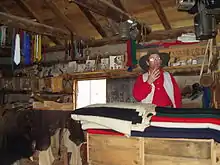Trading post
A trading post, trading station, or trading house, also known as a factory, was an establishment or settlement where goods and services could be traded.
_1900.jpg.webp)
A factory at Bathurst (Gambia) around 1900

A recreation of a typical trading post for trade with the Plains Indians
Typically the location of the trading post would allow people from one geographic area to trade in goods produced in another area. In some examples, local inhabitants could use a trading post to exchange local products for goods they wished to acquire.[1]
Examples
Major towns in the Hanseatic League were known as kontors, a form of trading posts.[2]
Charax Spasinu was a trading post between the Roman and Parthian Empires.[3]
Manhattan and Singapore were both established as trading posts, by Dutchman Peter Minuit and Englishman Stamford Raffles respectively, and later developed into major settlements.
Other uses
- In the context of scouting, trading post usually refers to a camp store in which snacks, craft materials, and general merchandise are sold.
- A "trading post" also once referred to a trading booth within the New York Stock Exchange.[4]
See also
References
- Trading post; Factory - Webster's Encyclopedic Unabridged Dictionary of the English Language, 1989
- BBC News https://www.bbc.co.uk/news/extra/A2MFANtn3Z/hanseatic_league
- Metropolitan Museum of Art, https://www.metmuseum.org/toah/hd/silk/hd_silk.htm
- New York Institute of Finance https://www.nyif.com/dictionary/t/term/tradingpost
This article is issued from Wikipedia. The text is licensed under Creative Commons - Attribution - Sharealike. Additional terms may apply for the media files.
